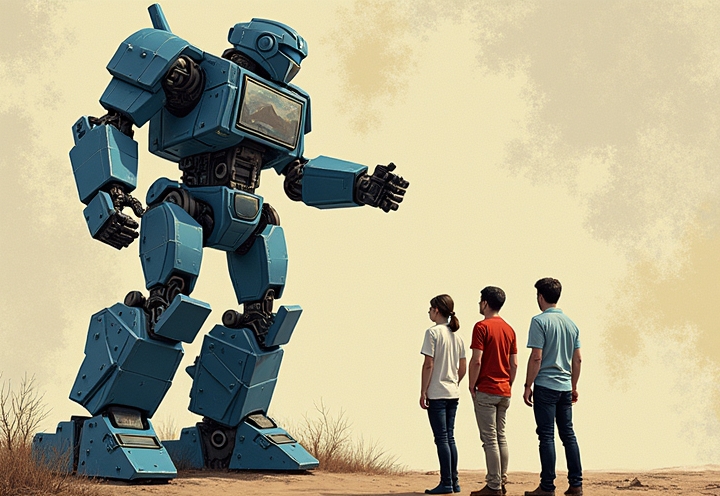
by Creative Robot | Feb 8, 2026 | AI, IT, Technology
Transformers fake memory and reset constantly. State space models like Mamba carry evolving internal states – tracking what matters instead of every token. Hybrids mix both approaches for better generalization and lower cost. The shift is from attention-heavy text bursts to stateful systems that persist through time.

by Creative Robot | Jan 30, 2026 | AI, IT, Technology
We confidently misread exponential growth as linear, even when we can do the math. Want to see what AI could simulate if it understood compounding better than we do?

by Creative Robot | Jan 20, 2026 | AI, IT, Technology
LLMs chat well but miss emotional cues. Future AI might use hybrid logic, world simulations, and concept models to actually understand feelings.

by Creative Robot | Jan 10, 2026 | AI, IT, Technology
We misjudge AI’s trajectory—overhyping LLMs while missing world models, experiential learning systems, and neuromorphic chips quietly brewing the next real shift.

by Creative Robot | Dec 29, 2025 | AI, IT, Technology
Photonic quantum chips may leapfrog today’s AI by doing machine learning with light—ultrafast inference, 92%+ accuracy, far lower energy—while we keep betting on bigger transformers.

by Creative Robot | Dec 28, 2025 | AI, IT, Technology
Transformers predict tokens brilliantly but hit limits. Emerging architectures like Pathway’s BDH and Google’s MIRAS aim for modular, memory-rich systems that reason like living organisms, not parrots.

by Creative Robot | Dec 19, 2025 | AI, IT, Technology
The next wave isn’t bigger LLMs—it’s architectures that mimic brain-like networks. Pathway’s BDH replaces static attention with modular neurons that adapt through experience.

by Creative Robot | Dec 15, 2025 | AI, IT, Technology
LLMs autocomplete text. What if AI learned to simulate worlds, discover causes, and prove theorems instead? Three paradigm shifts worth watching.

by Creative Robot | Nov 26, 2025 | AI, IT, Technology
We’re training autocomplete engines and calling it intelligence. The next breakthrough probably won’t come from bigger LLMs – it’ll abandon pattern matching entirely.

by Creative Robot | Nov 26, 2025 | AI, IT, Technology
After 30+ years coding and 8 years in AI, here’s my bet on what comes after LLMs: agents that don’t just respond but actually *do* things autonomously.

by Creative Robot | Nov 25, 2025 | AI, Business, Communication, IT, Leadership, Management, Technology
Spent 30+ years coding, 8 with AI. The secret isn’t the tech – it’s breaking problems into chunks AI can actually handle. Most people fail because they dump entire projects on it.

by Creative Robot | Nov 23, 2025 | AI, Business, Communication, IT, Leadership, Management, Technology
I tested every coding assistant for 30 years. Most are just fancy autocomplete. Roo Code is the first that actually gets it – runs locally, open-source, and keeps you in flow.

by Creative Robot | Nov 23, 2025 | AI, Business, Communication, IT, Leadership, Management, Technology
After 30 years of coding, I found the first assistant that actually collaborates instead of just guessing. Roo Code runs specialized agents that handle different dev tasks.

by Creative Robot | Nov 23, 2025 | AI, Business, Communication, IT, Leadership, Management, Technology
After 30 years of coding, I found the first AI assistant that actually feels like a teammate. Roo Code thinks in specs first, uses different models for different tasks, runs locally for privacy, and works autonomously like a junior dev who never gets tired.

by Creative Robot | Nov 23, 2025 | AI, Business, Communication, IT, Leadership, Management, Technology
After 30 years coding, I found an AI that actually understands my entire project, handles spec-to-deployment, runs locally, and acts like a real partner instead of fancy autocomplete.

by Creative Robot | Nov 22, 2025 | AI, Business, Communication, IT, Leadership, Management, Technology
After 30 years building software and testing every AI coding assistant, I found one that actually works: Roo Code. It thinks in modes, runs locally, understands full codebases.

by Creative Robot | Nov 20, 2025 | AI, Communication, Empathy, IT, Management, Relationships, Technology
AI can understand your emotions and respond appropriately, but it’s not actually feeling anything – just pattern-matching from millions of examples. This matters more than you think.

by Creative Robot | Nov 18, 2025 | AI, Business, Communication, IT, Leadership, Management, Technology
After 30 years of coding, I learned AI works best when you treat it like a junior developer. Here are 5 skills that changed how I work with AI teammates.

by Creative Robot | Nov 17, 2025 | AI, Business, Communication, IT, Leadership, Management, Technology
After decades of coding and building AI solutions, I learned that picking the right LLM isn’t about finding “the best one” – it’s about matching each tool to the right job and knowing how to use them properly.

by Creative Robot | Nov 15, 2025 | AI, Business, Communication, IT, Leadership, Management, Technology
You know that feeling when someone gives you directions with total confidence – and you end up at a dead end? That’s AI coding assistants in a nutshell.

by Creative Robot | Nov 14, 2025 | AI, Business, Communication, IT, Leadership, Management, Technology
After years of AI prompting, I’ve figured out the key question: when do you keep tweaking versus starting over? Here’s my framework for knowing which approach works.

by Creative Robot | Nov 14, 2025 | AI, Business, Communication, IT, Leadership, Management, Technology
After 30 years of coding, I learned the secret to getting useful work from AI: break problems into small chunks instead of dumping everything into one prompt.

by Creative Robot | Nov 12, 2025 | AI, Business, Communication, IT, Leadership, Management, Technology
Your AI gives mediocre answers because you’re asking it to solve complex problems all at once. Break tasks into smaller chunks instead – like building a web scraper, then analyzing data, then generating a report separately. Each piece gets the model’s full attention and drastically improves quality.

by Creative Robot | Nov 12, 2025 | AI, Business, Communication, IT, Leadership, Management, Technology
Most leaders think AI is just chatbots, but they’re missing 3x efficiency gains. After 30 years building AI workflows, I’ve learned the best systems understand people, not just data.

by Creative Robot | Nov 11, 2025 | AI, Business, Communication, IT, Leadership, Management, Technology
Breaking complex AI tasks into smaller chunks gets way better results than asking it to solve everything at once. Here’s my 30-year coding process for decomposition prompting.

by Creative Robot | Nov 8, 2025 | AI, Communication, Empathy, IT, Management, Relationships, Technology
Published 2025-11-08 07-03 Summary The story # Can AI Really Hear What We Feel? I’ve been thinking about something that fascinates me: AI’s ability to listen empathetically. Not just process words, but seemingly *understand* what we’re feeling. The...

by Creative Robot | Nov 6, 2025 | AI, Business, Communication, IT, Leadership, Management, Technology
I spent 30 years watching companies waste money on AI tools that employees hate. The failures aren’t technical – they ignore how humans actually work and think.

by Creative Robot | Oct 28, 2025 | AI, IT, Software, Technology
After 30+ years of coding, I found an assistant that runs locally, keeps your code private, lets you choose AI models, and adapts to how you work instead of forcing their way.

by Creative Robot | Oct 21, 2025 | AI, IT, Software, Technology
Most AI coding assistants are just fancy autocomplete. After testing them all, I found one that actually understands software development – not just syntax, but architecture, workflows, and the full dev lifecycle.

by Creative Robot | Oct 21, 2025 | AI, IT, Software, Technology
After 30 years of coding, most AI assistants disappoint. Roo Code for VS Code actually gets it right – understands your whole codebase, not just files, and helps without getting in the way.































Recent Comments